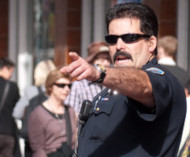8/14/2019
North Carolina Court Criminalizes Flipping Off A CopOffending a police officer with a gesture is a potential crime worthy of investigation under a new North Carolia Court of Appeals ruling.

The North Carolina Court of Appeals last week distanced itself from other courts around the nation by turning an offensive gesture directed toward a police officer into a potential crime worthy of investigation. The divided three-judge panel upheld the conviction of Shawn Patrick Ellis, who had flipped off a cop while he was a passenger in an SUV driving on US Highway 52 in Albemarle County on January 9, 2017.
The annoyed a North Carolina Highway Patrol who dropped what he was doing and pursued the SUV. Ellis's wife was driving, and she pulled over. The officer knocked on the passenger-side window and demanded Ellis show identification. Ellis, who was not driving, did not comply.
"What did we do wrong?" asked "This is not a stop-and-ID state."
His wife provided her driver's license, but Ellis was ordered out of the vehicle so he could be handcuffed and thrown in the back of the officer's patrol car. After a warrant check turned up negative, he was released with a citation for "resisting, delaying, and obstructing an officer." In reviewing the legality of the initial stop, the court majority acknowledged other courts have rejected similar traffic stops on First Amendment grounds. Nevertheless, the court majority here insisted the stop was legitimate.
"The issue is whether the trooper had reasonable suspicion that criminal activity was afoot," Judge R. Christopher Dillon wrote for the majority. "The trooper saw defendant make rude, distracting gestures while traveling on a highway in a moving vehicle in the vicinity of other moving vehicles. A reasonable, objective officer having viewed defendant's behavior could believe that a crime had been or was in the process of being committed... Defendant's actions, both his waving and middle finger taken together, aimed at an unknown target could alert an objective officer to an impending breach of the peace."
With the traffic stop deemed legitimate, the court held it was acceptable to hold Ellis further for being uncooperative. Judge John S. Arrowood disagreed with his colleagues, saying it was utterly implausible that the officer was concerned about a crime that impacted public safety.
"If that was truly his concern he could have followed the vehicle further to see if there was evidence of some road rage toward other vehicles," Judge Arrowood wrote in a dissenting opinion. "He did not do so, nor did he testify that he saw any improper driving. He chose not to take any actions to determine if road rage was occurring. Instead, he initiated an improper search and seizure to engage in an improper fishing expedition to find a crime with which to charge the defendant who had directed an obscene gesture to him moments earlier."
A copy of the ruling is available in a 150k PDF file at the source link below.


